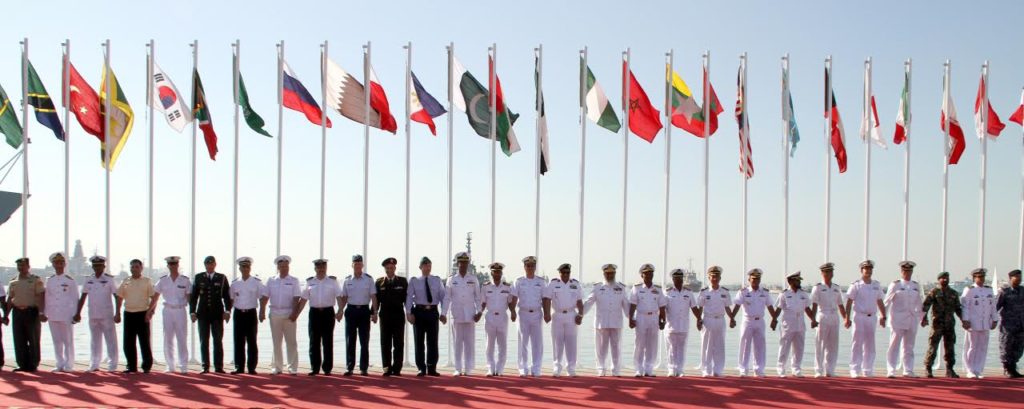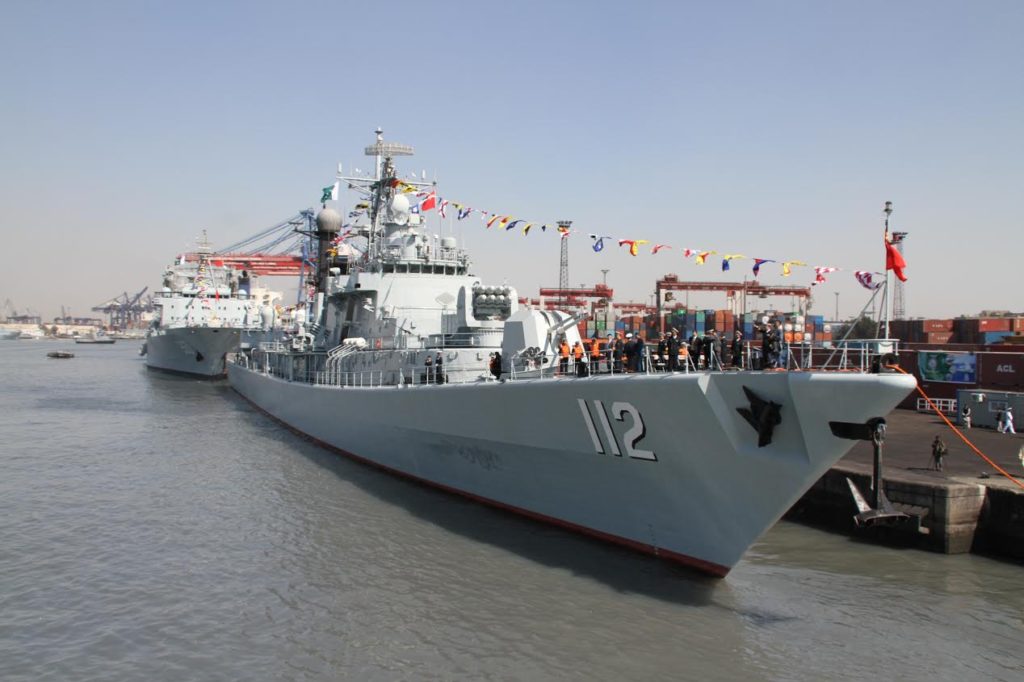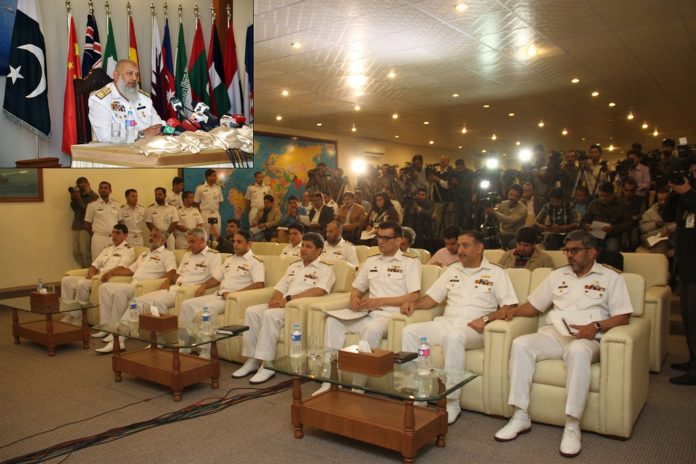Pakistan is located adjacent to the most important maritime trade routes such as the Straits of Hormuz and Bab Almandab. Not only these two choke points, but its connection with Suez Canal and the Gulf of Aqaba made it lot more visible for global Navies and especially for Pakistan Navy In terms of its naval strategic doctrine. Keeping an eye on the world’s most crowded oil supply traffic that passes through the Straits of Hormuz, Bab Almandab and Suez Canal, it seems obvious that the main critical maritime regions are located in the Middle East and every trading nation would find it extremely important to safeguard its oil supply routes from any threat or interruption. There are many challenges in this domain, particularly maritime piracy that is a problem near the Somalian waters, global terrorism as well as political ambitions.
Adding new economic and strategic dimensions to the above mentioned challenges, the strengthening ties between Pakistan and China through CPEC is also another dimension because China wants to safeguard its oil supply from Middle East passing mainly through the Straits of Malacca which is under Allied influence and can come under naval blockade in case of any high level tensions between the US and China. The gee-political importance of CPEC· is a critical factor for the future and for Chinese engagement with maritime security in the Arabian Sea and Indian Ocean along with Pakistan navy.
The Pakistan Navy is fully commit ted to peace and stability in the Arabian Sea and the Indian Ocean. Besides participation in international coalitions, the Pakistan Navy has also taken other initiatives for collaborative maritime security. In this regard its multilateral exercises AMAN is being held biennially since 2007. AMAN Exercise is a clear manifestation of Pakistan’s commitment towards peace and stability through harmony and collaborative maritime security between the navies of the East and West. Pakistan being an important player and stake holder continues to contribute significantly and play its due role in promoting peace and stability in the Arabian Sea and Indian Ocean.
In keeping with tradition, Pakistan Navy organized the Multinational Naval Exercise AMAN 2017 which was held from 10th to 14th Feb, 2017 at Karachi in which navies of 37 countries participated, out of which 09 countries were participating with naval assets including Australia, China, Indonesia, Turkey, Sri Lanka, UK, USA, Japan and Russia.
The exercise was based on Pakistan Navy lead initiative to bring in various navies under one umbrella. The current exercise is the fifth in the series and has attracted a growing number of participants every year, this year 37 nations participated through ships, aircrafts, Special Operating Forces, Observers and speakers. One of the key features, other than the sea exercise, is the international maritime conference spread over three days organized by National Maritime Policy Research Centre.
Upon arrival, the visiting ship were given a warm welcome by senior Pakistan Navy officials amid catchy tunes of national songs played by Pakistan Navy band Officials of the consulates of vising countries were also present or the occasion.
During this exercise the participating units rehearsed various naval operations to enhance mutual understanding and regional stability. The aim of this exercise is to display united resolve against terrorism and crimes in the maritime domain. The exercise will also help in enhancing Pakistan Navy’s inter operability with regional and extra regional navies thereby acting as a bridge between the regions.

It is worth mentioning that member states of the six-nation Gulf Cooperation Council (GCC) namely Kuwait, Saudi Arabia, Bahrain, Qatar, UAE and Oman also took part in this major multi-national naval exercise. The exercise AMAN’ 17 was very well covered by the media in the Gulf which sought to address challenges from the region al conflicts, political interests and terrorism. Other participating countries were Azerbaijan, Bangladesh, Brazil, Denmark, Egypt, France, Iran, Italy, Kazakhstan, Malaysia, Maldives, Morocco, Myanmar, Nigeria, North Sudan, Philippines, Poland, South Africa, South Korea, Tanzania and Turkmenistan.
The details of countries participating with naval assets are given in the chart below:
| a. | USA | USS AMELIA EARHART (OILER), USCGS MAUI, USCGSAQUIDNEK and USS TYPHOON |
| b. | China | HARBIN DOG 112, HANDAN FFG 575 and DONGPHINGU AO 960 |
| c. | Russia | SEVEROMORSK (ASW), AlTAY Tug Boat and DUBNA tanker |
| d. | Sri Lanka | SLS SAMUDRA |
| e. | Turkey | TCGGELIBOLU |
| f. | UK | HMS DARING |
| g. | Indonesia | KRI SULTAN ISKANDARMUDA |
| h. | Australia | HMASARUNTA |
| j. | Japan | 02 x P3C ORION aircraft |
Prime Minister Mohammad Nawaz Sharif in his message extended a warm welcome to all participants who traveled from across the seas to participate in Multinational Exercise AMAN-17 and said that “Maritime security challenges need to be focused collectively by the international com munity as no country can counter these challenges single handedly. Pakistan being a major stakeholder in maritime security of Arabian Sea is fully committed to ensuring freedom of navigation and lawful maritime order. Through AMAN series of Exercises, Pakistan Navy has been able to act as a bridge in the maritime domain by bringing together the Navies of East and West on one platform. Pakistan’s geo-strategic prominence capitalized with the launching of China Pakistan Economic Corridor (CPEC) project will become a ‘Game Changer’ for the region”.
Speaking on the occasion of for mal commencement of the exercise, Commander Pakistan Fleet Vice Admiral Arifullah Hussaini said that ‘we are here for a common purpose, for a common goal to ensure security, to make this world safe for us, for rest of the humanity so that there is a peace which brings prosperity and progress that is what our constitution mandates us to do. We believe in inclusive policy and we think that if the world stands together, there will be great benefits for all of us.’ The Admiral said that the region was experiencing swift geo-strategic changes which has provided Pakistan with not only diversified challenges but also with many opportunities that mandate a secure environment not only within Pakistan but also in the region at large.
The Admiral reiterated that Pakistan Navy has always been a consistent security -contributor in Indian Ocean Region. Being a lead nation, Pakistan’s Maritime forces are actively participating with other navies in combating narcotics trade, human smuggling, gun running, terrorism and piracy at the high seas. ‘We need to make collective efforts to eliminate these threats for lasting peace in the region’, he stressed. The importance of this collaboration will further enhance with the complete operationalization of CPEC and Gwadar Port meant to bring in prosperity not only to Pakistan but the region and beyond.
The Admiral added that multinational exercise AMAN 17 is an effort which will surely improve response, tactics and procedures among various maritime forces operating in the region. The concept of the exercise is to promote understanding which will be developed through formal and informal interactions. The exercise is expected to further refine the concept of ‘collective and collaborative’ security among the participants. Pakistan in general and Pakistan Navy in particular takes immense pride in leading these efforts. He elaborated that Pakistan, due to its geographical location being situated at the crossroads of three important regions of Middle East, Central Asia and South Asia and vicinity to the global energy highway, Gulf of Oman and Strait of Hormuz, is considered as a very important country of the region.”
Commander Pakistan Fleet extended a warm welcome to the participating Navies and hoped that their presence/ togetherness would forge a cooperation and brother hood which will prevent conflicts and should there be one, everyone would quickly resolve it to establish and maintain lasting peace. He also valued participating nations for sup porting Pakistan’s resolve for ensuring peace in the region.
The Pakistan Navy has actively participated and played a lead role not only in organizing the joint exercises like the AMAN series, but also in the Coalition Maritime Campaign Plan (CMCP) and commanded TF- 150 four times to monitor and control drugs and arms smuggling in the North Arabian Sea and deter and deny the use of sea to potential terrorists. So far, thirty nine warships of the Pakistan Navy along with helicopters have participated in CMCP.
With the global security land scape having undergone significant transformation following the tragic events of 9/11, highly complex and multifaceted challenges have evolved such as extremism that engulfed many nation states causing huge socio-economic impact. The region has been in the midst of this strategic transformation in global security paradigm and remains afflicted by many active high intensity conflicts going on in the world. Many regional nations also continue to spend heavily on their military, resulting in massive arms buildup on land and sea. The significance of sea for Pakistan, as is the case with most countries, is that more than 95% of Pakistan’s trade is sea-borne and major requirement of its oil imports comes from the Gulf. Continuous flow of energy resources through the Strait of Hormuz is essential for sustenance of its economy.
Pakistan’s Exclusive Economic Zone (EEZ) is spread over 240, 000 Sq Km, with continental shelf extending a further 50, 000 sq km. The area is rich in fishery, possibly hydrocarbons and seabed resources and Pakistan aspires to leverage the EEZ for socio economic development. It is therefore, in Pakistan’s interest to see that the environment at sea is secure and stable to pursue its legitimate interests unimpeded.
Additionally, Pakistan is also pursuing development of maritime infrastructure especially along the Makran coast and Gwadar is a major commercial undertaking to become trans-shipment port under Pakistan China Economic Corridor (OBOR vision). The emerging maritime scenario in the Indian Ocean and Arabian Sea thus necessitates a more dynamic role for Pakistan.

At the international level, enhancing maritime security of the region through participation in the efforts against terrorism and contributing towards stability and peace in the area are the focus of Pakistan’s continuous attention. The stability in this region is also essential for securing the vital energy supplies of the world which is a common interest of Pakistan and the international community. In this regard, sustained and concerted efforts of coalition forces and regional players are required to maintain security.
At the regional level, Pakistan can play a lead role forming an alliance of regional navies especially Turkey, Iran, GCC nations and Egypt to safeguard interests in Persian/ Arabian Gulf, Strait of Hormouz, Gulf Of Oman, Indian Ocean, Bab-almandab, Red Sea, Suez Canal and further Eurasian Basphorus. Saudi Arabia is making an effort to create such a military alliance to combat terrorism which is a right step towards a right direction.
The world is changing rapidly and strategic alliances are reshaping due to changing dynamics of the power corridors from Unipolar to Bi-polar and even Tri-polar world. The byproducts of above said power struggle between various centers resulted in emergence of non-state actors, especially in Muslim dominated countries which created chaos and anarchy and hence contributed in collapse of some nations.
Pakistan is going to combat terrorism with all its might and has destroyed majority of the terror net works and their infrastructure. Pakistan has to keep an eye on hostile states like India and Afghanistan and their spy networks, mainly the NDSl/RAW nexus which aims to disrupt the China Pakistan Economic Corridor (CPEC) and intends to create chaos in Pakistan in the same way as was done in some Middle Eastern nations. More importantly, India claims it will isolate Pakistan from the world using its global links. Through exercises like AMAN ’17 it has been established that India cannot be successful in her ambitions as the world likes to engage with Pakistan and is totally ignoring Indian designs that has resulted in India’s total diplomatic failure.
Pakistan has resilience as a nation to combat all forms of terror ism and is fully capable to deal with threats to its security and integrity. With efforts in place like Zarb-e Azb and Operation Radd-ul-Fasaad from the Pakistan army side, the Pakistan navy is also highly vigilant and committed to safeguard CPEC and combating Pakistan’s maritime challenges.





